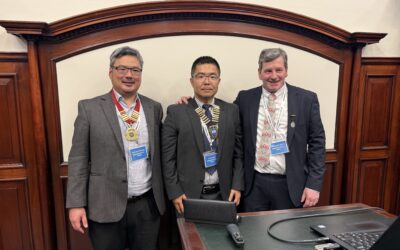Engineering Council and NCEES (USA) Sign
Historic Mutual Recognition Agreement
Prof. John Chudley,
Chair of the Engineering Council
www.engc.org.uk
The Engineering Council has signed a landmark Mutual Recognition Agreement (MRA) with the USA’s National Council of Examiners for Engineering and Surveying (NCEES).
The agreement was signed in Chicago by Laura Sievers, President of the NCEES and John Chudley, Chair of the Engineering Council. This significant event marks the first international agreement of its kind with any international counterpart in the NCEES’s 104-year history. This agreement establishes a streamlined process for recognising professional engineering qualifications between the UK and the USA and ensuring that engineers can practice across borders with greater ease and without compromising on professional standards.
As engineers are licensed at the state level in the US, participation in this agreement is determined by individual state licensing boards. Today, 26 US states have already confirmed their intent to participate in the agreement, marking a significant step forward towards wider adoption.
UK Chartered Engineers and US Professional Engineers wishing to use the streamlined route provided by the agreement will need to hold the International Professional Engineer (IntPE) title. To find out how to obtain this in the UK, see the Engineering Council website, and in the US see NCEES.
Source: Engineering Council Press Release
Contact: Helen Potts, Engineering Council – hpotts@engc.org.uk Tel: 020 3206 0568
Highlights of the MRA include:
-
Simplified Pathways for Certification: UK Chartered Engineers can now more easily obtain a US Professional Engineer license in participating states and US Professional Engineers can more easily achieve the CEng title in the UK.
-
Minimisation of Redundant Assessments: By recognising the equivalency of qualifications, the agreement removes the need for repeated assessments, thereby simplifying the certification process.
-
Increased Professional Mobility: The agreement opens new opportunities for engineers to work across the UK and the US, facilitating their professional growth and development.
-
Support for Key Industries: The agreement strengthens the engineering profession in both countries, supporting industries such as construction, automotive and aerospace.
-
Enhanced Trade in Engineering Services: By reducing restrictions on cross-border services provision, the agreement encourages the growth of international trade in engineering services.



